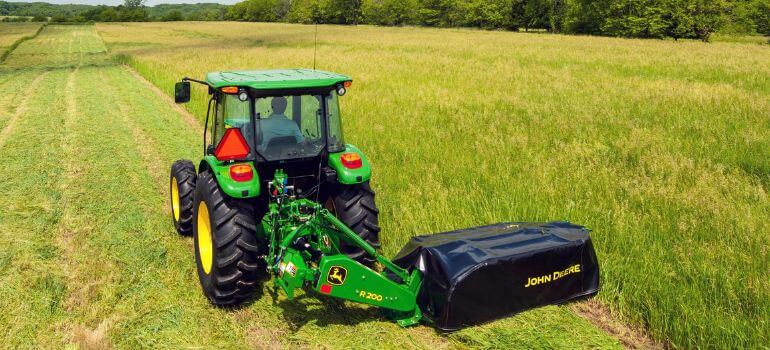Introduction
In the world of hay harvesting, two popular equipment options often come into the spotlight: drum mowers and disc mowers. Whether you’re a seasoned farmer or just starting out, the choice between these two machines can greatly impact your efficiency and the quality of your forage. This article delves into the key differences between drum mowers and disc mowers, helping you make an informed decision for your agricultural needs.
Drum Mower: Unveiling the Champion
The Basics of a Drum Mower
Drum mowers, also known as rotary drum mowers, are widely appreciated for their robust design and simplicity. They consist of a set of rotating drums with multiple cutting blades, attached to a tractor’s three-point hitch. These mowers are well-suited for large fields with a heavy grass volume.
Advantages of Drum Mowers
- High Capacity: Drum mowers are known for their high throughput, allowing you to cover extensive areas quickly.
- Sturdy Build: Their simple and durable design minimizes the need for frequent maintenance.
- Clean Cutting: Drum mowers provide a clean cut, promoting faster drying of the forage.
Limitations of Drum Mowers
- Ineffective on Uneven Terrain: Drum mowers may struggle on rough or uneven ground.
- Requires a Powerful Tractor: To operate a drum mower effectively, a powerful tractor is often necessary.
Disc Mower: The Modern Approach
The Core of a Disc Mower
Disc mowers utilize a series of rotating circular blades arranged in a disc. These mowers are known for their precision and adaptability, making them suitable for various farming conditions.
Advantages of Disc Mowers
- Exceptional Precision: Disc mowers offer clean, precise cuts that promote rapid drying of the harvested hay.
- Adaptable to Terrain: They perform well on uneven and sloped terrains, making them versatile for different farm layouts.
- Easy Maintenance: Disc mowers are generally easier to maintain compared to drum mowers.
Limitations of Disc Mowers
- Slower Output: Disc mowers may have a slower work rate compared to drum mowers, especially in larger fields.
- Initial Cost: They can be more expensive to purchase initially.
Which One Should You Choose?

Factors to Consider
- Field Size: For large, flat fields, a drum mower might be more efficient. Disc mowers are better suited for smaller, uneven terrains.
- Terrain Condition: Consider the topography of your field. Disc mowers excel on slopes and rough terrain, while drum mowers work better on flat surfaces.
- Budget: Evaluate your budget as drum mowers tend to be more cost-effective initially, but disc mowers might offer long-term savings.
Making an Informed Decision
The choice between a drum mower and a disc mower ultimately depends on your specific needs and budget. Each has its own advantages and limitations, so it’s crucial to assess your individual farming conditions.
Conclusion
In the world of hay harvesting, choosing between a drum mower and a disc mower is a significant decision. By understanding the unique features and limitations of each type, you can make an informed choice that optimizes your hay production and farm efficiency.
FAQs
1. Which mower is better for a small, hilly farm?
- If you have a small, hilly farm, a disc mower would be a better choice due to its adaptability to uneven terrain.
2. Are disc mowers more expensive to maintain in the long run?
- While disc mowers may have a higher initial cost, they are often easier and more cost-effective to maintain over time.
3. Can I use a drum mower on a sloped field?
- Drum mowers are best suited for flat fields and may struggle on sloped or uneven terrain.
4. Do drum mowers require a specific type of tractor?
- Yes, drum mowers generally require a powerful tractor to operate effectively.
5. Are there any specific safety precautions for using these mowers?
- Always follow the manufacturer’s safety guidelines and ensure proper maintenance to prevent accidents.
